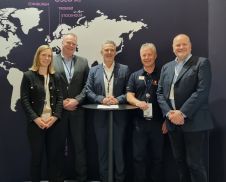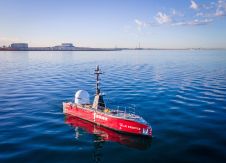The Alchemy of the Sea
The Search for the Young Experts to Plug the Increasing Skills Gap
Recruitment and retention issues due to effects of the boom and bust of the hydrocarbon industry are still rocking the profession. The author suggests that the dawn of carbon-neutral energy generation will greatly benefit offshore survey. A fresh re-envisioning of the profession and those that it serves could produce a substantial rise in recruitment.
As I walk my dog on a very windy Norfolk beach and look out at the North Sea I am only too aware that the wealth and prosperity these waters have brought to the United Kingdom in the last three decades is now coming to an end. I am, of course, referring to the United Kingdom Continental Shelf, our east-coast treasure. We are reminded frequently here that we are facing the sunset of our oil & gas industry, and that in order for our industry to survive it has either to look much further afield or to diversify. No longer can we remain in the relative safety of home waters; we must now negotiate territories where corruption and threat to life and property are common practice, and where political machinations can bring to an absolute halt an exploration project. To diversify at home means decommissioning platforms and finding alternative uses for them, or pushing for even greater alternatives in energy production.
Skills Shortage
I wrote an article for this journal some time ago in which I explored the skills shortage currently of such urgent concern to the survey and geophysical professions. In that piece I contrasted my doctoral findings from the study of a group of offshore engineers to the issues of recruitment and retention in the service sectors of oil & gas exploration. From my findings it had become clear that this was not an isolated problem affecting just one area but was a common experience across the whole industry. I tentatively concluded that, as this problem was so immense, trying to address it in isolation as simply engineers, technicians, surveyors or geophysicists was not the answer; an industry-wide problem required an industry-wide solution. In saying this I knew I was not a lone voice, but the message seems to be falling on deaf ears. For not only has the industry failed to seek collective solutions, the bipartisan approach of large operators means that companies offering the biggest salaries are still those with the biggest marketing and recruitment opportunities, as vouchsafed by anybody familiar with Shell’s huge advertisements for technicians and engineers.
We can put this problem into a context; the difference of life in the twenty-first century, an underlying energy discourse between western governments, the current war and hardship suffered in some oil-producing countries. I would like you to ask yourself, were you a young person at university taking a geology degree would the prospect of entering this industry appeal to you? When the alternatives are relatively easy world travel thanks to low-cost airlines, or taking a gap year or two to do other things elsewhere? And given the message that oil is running out and there is a need to find other sources of energy, what is the point of going into this industry in the first place? Further, there is the prospect of an unsafe profession, when the possible areas of the world to which you may be sent are war-torn, corrupt and politically unstable. The decision not to join the profession would, it seems to me, not be a hard one. Particularly if the prospect of employment in other industries is seen as offering more comfort, even the attraction of higher salaries or travel would be insufficient incentive.
Worth Gold
What is more, the exploitative practices of the oil & gas industry have lost it more recruits that it might have gained. What was ‘normal’ in the days of the real roughnecks of the 70s is no longer acceptable or practical. Gone are the days when working in the industry meant ‘men were men’ and you had to be tough to survive. This was a rite of passage for many personnel still working in the industry, and it is their impending retirement and the lack of recruitment and retention that faces the future development of the industry with being throttled by lack of interest on the part of young people. No longer can people be expected to work in appalling conditions and treated as ‘less than…’ The significant contribution made by industry personnel to the wealth of their employing companies (and to global wealth) has to be recognised. Without their experience and wondrous expertise there would not be the finds and wealth that keep the pipelines flowing.
In my travels and experiences acquiring research data I have now met many individuals employed to go offshore and find those places where the operators might drill. There is the career geologist who has attended university to explore and study the layers and surfaces that make up this world. He or she looks at marks on the ground, the properties of the soil, sonic traces of technology; and using analysis and interpretation uncovers the treasures that the earth conceals. There is something magical about these practises, the art of the alchemist, the phrenologist; like Merlin they convert the indistinct and indecipherable into financial reward, base metal into gold. My observation is that these people differ in many ways from their compatriots in the multinationals. It is the scientist as opposed to the engineer, the analyst to the technocrat; this is the dichotomy that has led to difference in the way individuals are treated offshore.
Rebirth
With the demise of the hydrocarbon gold rush and the move towards alternative energy sources there arises an opportunity to rewrite the fate of the surveyor and the geophysicist, finally to recognise their contribution to keeping the lights on. No longer will they have to expose themselves to the instability of the oil industry, for the advent of offshore wind farms and hydroelectric installations are demanding their expertise in ever-increasing numbers. There is a growing need for skilled individuals to work in the clean, carbon-neutral sectors and with these new explorations come new working practises, new facilities and technologies. A cultural change is taking place: the breed of roughneck is giving way to the environmentally conscious energy producer. More and more professionals are voting with their feet, demonstrating their preference for working in these areas. Universities are acknowledging the interest shown by their students in ecological responsibility. This birth of green energy generation could also be a rebirth for the alchemy of geophysics, the phrenology of survey.
Self-esteem
To return to my earlier article, in which I posited the three phrases belonging to the professional surveyor or geophysicist: Probably, Possibly, Maybe? There may not be the volume of work at the moment to enable a transfer of all our offshore personnel from hydrocarbons to carbon-neutral development, but this may come in the future. When it does, it will probably affect the profession in a very positive manner, enabling a rise in professional self-esteem. We may see a growth in clean, green, carbon-neutral energy provision thanks to the professional input from this sector. But one thing is certain: oil-men (and women) are oil-men, and they do not transfer with such ease from one sector to another. The individuals that work in geology and survey do. This ability to change allegiance and work more professionally in other sectors will definitely make the oil industry sit up and take notice, for if they cannot retain the services of the best they are going to have to change their practises. I wish you all in this profession a bright and prosperous future.
E-mail: [email protected]

Value staying current with hydrography?
Stay on the map with our expertly curated newsletters.
We provide educational insights, industry updates, and inspiring stories from the world of hydrography to help you learn, grow, and navigate your field with confidence. Don't miss out - subscribe today and ensure you're always informed, educated, and inspired by the latest in hydrographic technology and research.
Choose your newsletter(s)
























